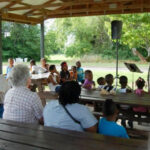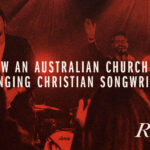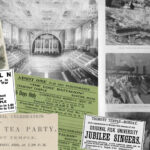The Arabian Peninsula has never been an easy place to live.
Nearly three-quarters of the land is hot, windy desert. For most of history, Bedouin nomads herded, fished, and fought over water. Even today, the population stays away from the barren middle and crowds around the Persian Gulf and the Red Sea.
For Christians, the political environment has been just as harsh. Every one of the peninsula’s seven countries is ranked on Open Doors’ World Watch List of the 50 hardest places to be a Christian. Christian churches are outlawed in Saudi Arabia. The civil war in Yemen leaves minority Christians vulnerable to increasing persecution.
But over on the eastern side, tucked up under the Persian Gulf, lies the United Arab Emirates (UAE).
It’s an Islamic country—the government blocks websites that disparage Islam and deports people who preach publicly or try to convert Muslims. The constitution declares all citizens are Muslim. Islamic law is taught in schools, and conversion from Islam is not recognized.
But “compared to the others, it’s an oasis of freedom,” said Mack Stiles, who has lived in the Middle East since 2001. One example: While UAE bans citizens from converting, foreigners are largely free to choose their own religion.
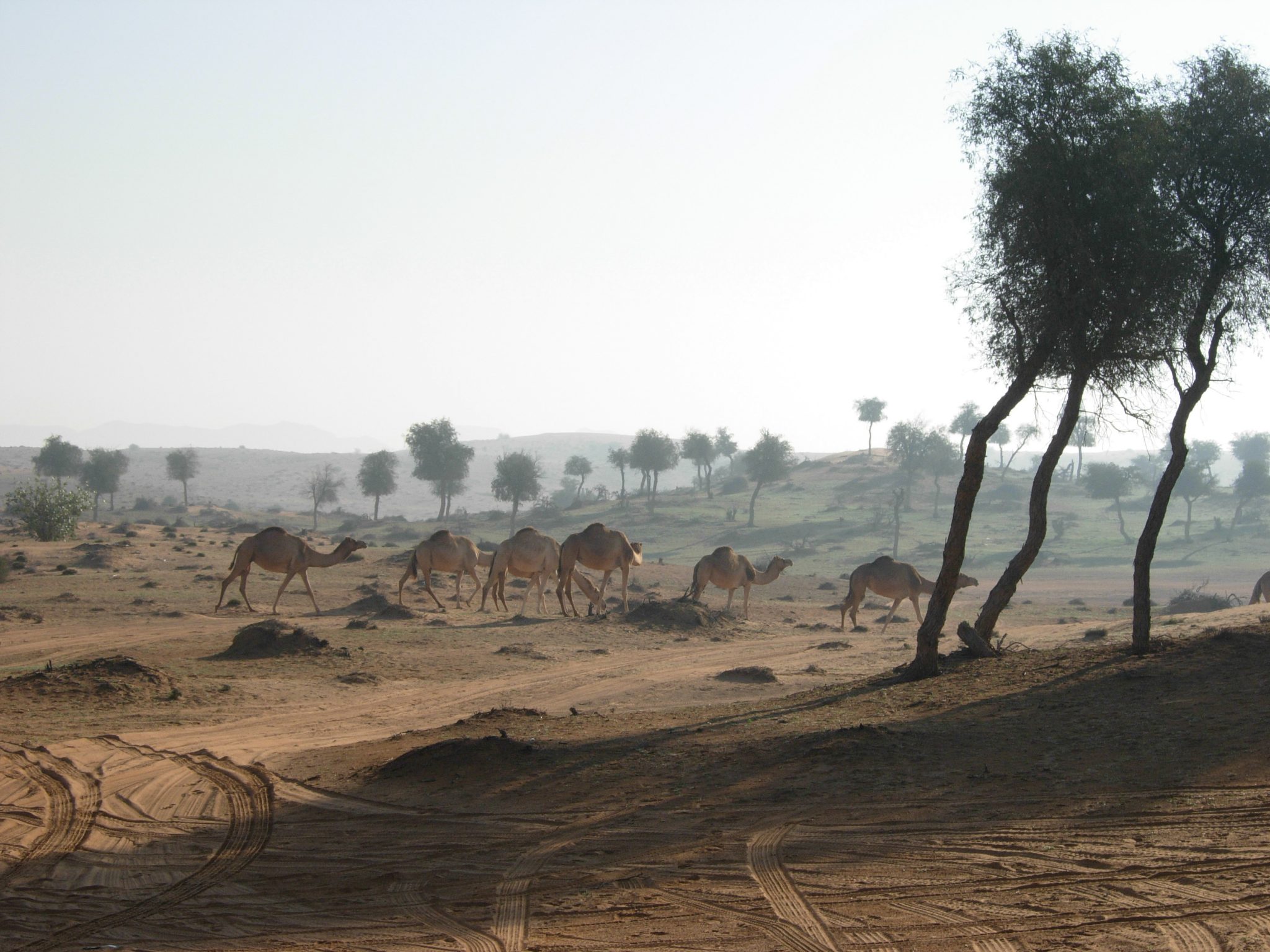
Stiles moved to Dubai to start a university student ministry, but when students started coming to Jesus, there was no gospel-preaching church to send them to. So Stiles got involved at United Christian Church of Dubai (UCCD)—preaching occasionally, becoming an elder, and eventually heading up their search committee for a new pastor.
Stiles called Capitol Hill Baptist Church pastor Mark Dever, who thought of John Folmar, then on staff at Capitol Hill. Folmar felt called to be in the mission field, but also felt like God was aiming him to pastor a congregation.
The situation seemed perfect. John and his wife, Keri, said yes almost before Dever finished asking the question.
The job turned out to be a lot harder than they’d expected—like many international churches, the UCCD for the most part preached a generic message with little doctrinal specificity. Its people were transient (“it’s like hugging a parade”) and “hyper-international,” which led to one communication misunderstanding after another, John said.
They were also alone. Few other churches in the region—in fact, in the Muslim world—taught Reformed theology.
Over 13 years, week after week, John has patiently preached the gospel. Some in the church pushed back. Some left. But more joined, and UCCD expanded.
“Now we have planted three churches, and those have begun to multiply as well,” John said. “We have seven to eight like-minded churches in this country. It’s an extraordinary situation.”
Extraordinary indeed. On the Arabian Peninsula, amid the sand and Sharia law, is a growing oasis of gospel teaching.
“It’s not like anyone engineered it,” John said. “I think the Lord honored the regular means of grace of evangelism and discipleship and preaching.”
From D.C. to Dubai
At 28, John Folmar was hoping to make it big—and was almost there.
After graduating from Duke University Law School, he was living in Washington, D.C., and working as a legislative counsel for the influential senator Jesse Helms. (He assisted with anti-crime legislation during Helms’s fifth term in the Senate.)
“I was where I wanted to be,” he wrote in The Underestimated Gospel. “And yet when I got there, I was empty and unsatisfied.”
While out for a run one day, he spotted Capitol Hill Baptist Church and figured he could “make some connections or meet influential people” there. He began attending, started meeting pastor Mark Dever for a morning Bible study, and realized “that I was a moral failure, that I couldn’t turn over a new leaf but needed a new life.”
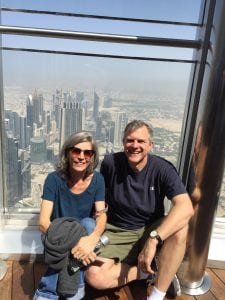
Capitol Hill Baptist introduced Folmar to Jesus and also to Keri Harrison, who also worked on the Hill. She was the chief counsel of the House Judiciary Subcommittee on the Constitution and would eventually write the Partial-Birth Abortion Ban.
John and Keri were the first couple who met and married under Dever at Capitol Hill Baptist. When John started feeling the tug to ministry, he ignored it, assuming Dever made everyone feel that way.
“I resisted at first because I figured I was being unduly influenced by my pastor, because he presents such a compelling vision for ministry,” John said. “My whole life was geared toward political office, and it was difficult to give that up. . . . Over time, my desire to study and teach the Bible eclipsed my professional objectives.”
A few years and a Southern Baptist Theological Seminary degree later, John became an assistant pastor at Capitol Hill Baptist.
Along the way, John and Keri “were drawn toward missions”—but didn’t think they could, because John wanted to pastor an English-speaking congregation. (“God, I know it won’t happen, but please send us overseas to share the gospel,” Keri would pray.)
The Dubai situation couldn’t have been a better fit. John and Keri could be missionaries in a majority-Muslim country, but also step into a ready-made, international, English-speaking congregation.
They both knew how rare that opportunity was.
UAE
Medical missionaries arrived in the United Arab Emirates (UAE) before the country even existed. (In 1960, a third of mothers and half of children died in childbirth there.) Their steady work gained the trust of the sheikhs, who invited them in, gave them land for a hospital, and still allow Arabic Bibles in the rooms and staff prayers with patients.
That relative religious tolerance continued even after oil was discovered off the shore of Dubai in 1966. The tiny port town exploded into a bustling global destination, and the surrounding emirates swiftly formed into an organized country (1971). Dubai quickly added an international airport (1971), the world’s largest man-made harbor (1979), and skyscrapers (1979). Over the next 40 years, UAE launched opened the world’s only seven-star hotel, built the world’s tallest building, and prototyped a hyperloop that can shuttle passengers 700 mph.
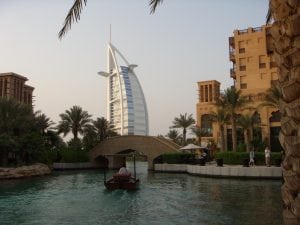
When a country with the same size population as Des Moines finds itself the owner of the world’s eighth-largest oil reserves, it has a problem: There aren’t enough people to staff the economic explosion that kind of money can generate. Somebody has to harvest the oil and build the skyscrapers and fly the planes. Others have to collect the trash, wash the windows, and answer the phones.
So the UAE hired it done. In 1970, UAE’s population was 235,000; by 1980, it topped 1 million. By 2017, it was more than 9 million. Of those, less than 12 percent were Emirati citizens.
“It’s unlike anyplace you’ve ever seen,” John said. “There are 200 nationalities in a population of nearly 3 million, in a city that sprung up within the last 20 years.”
English is often a second language, which makes communication easy to mess up. And the transience of the workers—for many, this isn’t home—can discourage deep relationships.
But the diverse population also means that people of 60 different nationalities walk into UCCD every week. All the preaching is done in the common language of English. And everybody—inside the church and out—is happy to talk about religion.
“In day-to-day life, it’s easy to share the gospel with someone who has never heard it before,” Keri said. For example, the tailor making her son a suit is a Muslim from Albania. “All I had to say was, ‘Do you know what an evangelical Christian believes?’ and I could share the gospel with him,” she said.
In that context, UCCD had no problem gathering a multiethnic congregation—it was easy.
It was the theology that was hard.
Patience
“International churches are not known to be strong evangelical witnesses, because we want to accommodate people from all different places,” John said. “The way that is commonly done is to lower the common denominator on the teaching, and to omit all the sharp edges of theology in order for everyone to get along. That’s how UCCD was.”
Many of the 600 people who attended “wanted entertainment—jokes and stories,” John said. But “I just began preaching consecutively through books of the Bible.”
Some people left. Some of the elders pushed back. After a sermon from 1 Peter 1:1–2 on election, one told him, “Our people don’t need that kind of theology. What they need is something practical, like marriage.”
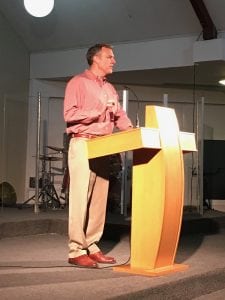
Some of the leadership also objected when John supported an initiative by Stiles to figure out who exactly the members were.
Before Stiles, “we were like a mob of people who would show up,” but nobody was a member, John said. “People are suspicious of authority, and they don’t like the idea of being accountable to one another.”
But that meant John didn’t know how to disciple them—or even whether they were believers or not.
“John was very, very patient,” said UCCD elder Etienne Nel. “You could see people getting a bit impatient, because now there was a line in the sand.”
But even that line took several years to draw. John moved slowly and didn’t push his elders too hard.
“He often submitted to what they wanted to do so long as he could keep preaching the Bible,” Keri said. (John credits some of his patience to his age—he was 38 when he landed in Dubai.)
Slowly, over the course of five to seven years, things began to change.
“People began to get a taste for expository ministry, for the centrality and authority of the Word of God,” John said. “Some people got saved, and over a period of years, the congregation began to move into a posture of wanting that kind of teaching.”
The Folmars were “a drink of water in a dry and weary land,” Stiles said. “When they showed up, it turbo-charged the church reform.”
The congregation began to grow, from 500 to 600 to more than 800. Keri started an inductive women’s Bible study that now draws more than 100 women. (“Our women grew to love—and even demand—these kinds of inductive studies,” she told TGC.)
But UCCD couldn’t move into a larger space, because “the church building was on the only land given to the evangelical church in all of Dubai,” John said. “We were growing numerically and bursting at the seams. . . . It was kind of like a pressure cooker.”
UCCD needed a way to relieve some of the pressure.
Planting
In 2010, UCCD planted a church about 30 minutes away. Over the past eight years, it has grown to 1,000 attendees and continues to serve its community.
Soon after, UCCD was granted land on which to build a church in the northernmost emirate of Ras Al Khaimah. Josh and Jenny Manley came from Louisville in 2012 to plant the church, which began steadily growing. The church building was completed in 2017.
“Church buildings in this part of the world are vitally important,” John said. “To have one means you have the stamp of approval from the rulers.” In a country where proselytizing is illegal, a church building also means people with questions about Christianity know where they can go to find answers.
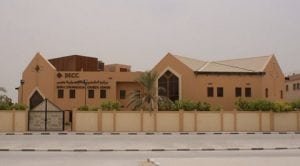
But land and buildings aren’t easy to come by. While the government doesn’t mind Christian expatriates, they aren’t interested in encouraging the growth of a non-Muslim religion. The congregations that meet are generally restricted to the few buildings that already exist. (Twenty congregations meet in UCCD’s building in Dubai.)
In the city of Sharjah, about 80 congregations rent time—one after another, from 6 a.m. to 9 p.m., seven days a week—in an Anglican church. When one of those time slots opened up in 2014, UCCD “jumped at the chance” to plant a congregation there, John said. The “two or three” families that were sent have grown to 110 attendees, 75 of whom are members, said planter Anand Samuel.
Three church plants in eight years would be a noteworthy accomplishment for any church, let alone one in a restrictive environment. John calls it “the Lord’s gracious work over a period of years.”
And it didn’t stop there.
‘Crying Need’
“We see a crying need in this part of the world for strong churches centered on the Bible,” John said. “There are precious few churches devoted to expository ministry, serious about Reformed theology, and preaching the gospel.”
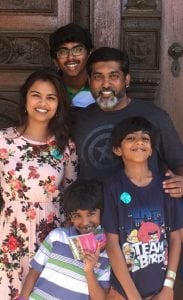
It wasn’t long before UCCD started training leaders. The church invites four to five pastors a year to come for nine months, learn Wayne Grudem’s systematic theology, undergo an ecclesiology “boot camp,” attend elders’ meetings, and become part of the church. (“We think a local church is the best context for a person to learn how to be a pastor,” John said.)
Nine months is longer than, say, the four-month pastoral internship at Capitol Hill Baptist. But the men John is training probably won’t be able to attend seminary, so he wants to keep them as long as he can. On the other hand, he’s pulling them away from their ministries, so he also wants to get them back as quickly as he can.
“We could fit more, but funding is a problem,” John said. Dubai isn’t cheap; it costs about $25,000 for UCCD to provide a visa, housing, and food for each of their interns. (UCCD and its supporting churches from overseas carry that cost.)
Over the past nine years, they’ve trained 40 men from hard-to-reach places such as Afghanistan, Tunisia, Syria, Pakistan, Morocco, India, Nepal, and Kazakhstan.
“We have a great base of operations here,” said Samuel, who was in the first pastoral internship class. “We can leverage that for the gospel.”
City on a Hill
“I think Dubai is a harbinger of things to come,” said Stiles. Last year, he moved to a small, new church in Iraq to do the same thing Folmar did—patiently and faithfully preach the gospel.
“We saw it happen in Dubai,” he said. “It was a vision of, ‘Let’s not just buy the status quo that international churches can’t have robust theology. God loves his church, and with some work and a little funding, we can turn this around.'”
In fact, international churches can be “self-supporting engines of mission work,” he said.
UCCD and its plants would love to spread gospel-preaching churches into Kuwait, Oman, Qatar, Bahrain—maybe even Saudi Arabia “if it opens up,” John said.
“There is incredible hunger and spiritual poverty in the countries next to us and across the water from us,” Nel said. “We trust the Lord and pray that the Spirit would be at work, convicting people and giving glory to his name. . . . We want to be an effective church—a city on a hill.”









